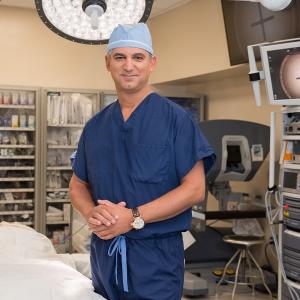Dr. David Samadi Highlights the Benefits of Robotic Surgery During September Prostate Cancer Awareness Month
Dr. David Samadi Emphasizes Robotic Surgery as the Superior Treatment for Precision, Recovery, and Quality of Life
This month reminds men to get screened, ask questions, and know their options. Robotic surgery is advancing prostate cancer care, and men deserve to know its benefits.”
NEW YORK CITY, NY, UNITED STATES, September 24, 2025 /EINPresswire.com/ -- September is Prostate Cancer Awareness Month, dedicated to encouraging men to prioritize their health and learn about advances in treatment. Dr. David Samadi, a world-renowned urologic oncologist at St. Francis Hospital in Roslyn, New York, highlights the role of robotic-assisted surgery for many men with prostate cancer. He is also the author of two books, The Ultimate MANual: Dr. Samadi’s Guide for Men’s Health and Wellness and Prostate Cancer, Now What? A Practical Guide to Diagnosis, Treatment, and Recovery.— Dr. David Samadi
“Prostate cancer is one of the most common cancers among men, but it’s also one of the most treatable—especially when caught early,” says Dr. Samadi. “This month serves as an important reminder that men need to be screened, ask questions, and understand their treatment options. With advances in technology, robotic surgery now plays a central role in evolving prostate cancer care, and men deserve to know the advantages it can offer.”
The Power of Robotics: Precision and Innovation
Robotic-assisted surgery, sometimes called robotic prostatectomy, has changed surgical methods by offering precision. With advanced robotic systems, surgeons perform delicate procedures through small incisions, which provides improved visualization and control.
“When it comes to prostate cancer, precision is everything,” notes Dr. Samadi. “Robotic-assisted surgery allows us to remove the cancer with unparalleled accuracy while minimizing damage to surrounding nerves and tissues. It’s a game-changer for men’s health.”
Dr. Samadi developed the SMART (Samadi Modified Advanced Robotic Technique) approach, which addresses three patient outcomes: removal of cancer, preservation of urinary control, and preservation of sexual function. This technique provides access to the prostate from the inside out, reducing trauma and helping men recover more quickly.
Faster Recovery, Less Disruption
Radiation therapy can involve weeks or months of treatment and potential side effects. By comparison, robotic surgery often includes a shorter hospital stay, less post-operative pain, and faster healing.
“Men often tell me their biggest fear is being sidelined by treatment,” Dr. Samadi explains. “With robotic-assisted surgery, we can get them back to work, back to their families, and back to their routines much more quickly compared to radiation therapy.”
Superior Long-Term Outcomes
One characteristic of robotic-assisted surgery is that it removes the prostate tumor entirely and immediately, unlike radiation therapy, which can take years to determine effectiveness.
“A benefit of robotic surgery is that it provides immediate removal of the tumor,” says Dr. Samadi. “This approach may give patients more clarity about their recovery process.”
Some research suggests that robotic prostatectomy is associated with lower recurrence rates and better long-term outcomes, which can be a factor in surgical decisions.
Safeguarding Quality of Life
Many men consider quality of life after treatment, specifically regarding urinary incontinence and erectile dysfunction. Robotic-assisted surgery uses nerve-sparing techniques to address these concerns.
“Quality of life remains an important consideration,” Dr. Samadi notes. “Robotic technology helps address functions that matter to men after surgery.”
Early Detection Makes the Difference
Dr. Samadi stresses that robotic surgery is most effective for men with localized prostate cancer—meaning the cancer has not yet spread beyond the prostate. That makes early detection through regular PSA testing and screenings essential.
“Education is important,” says Dr. Samadi. “Men should be proactive, ask questions, and consult a specialist. For those with localized prostate cancer, robotic surgery may be an appropriate option.”
About Dr. David Samadi
Dr. David Samadi is Director of Men’s Health and Urologic Oncology at St. Francis Hospital in Long Island. He is a board-certified urologic oncologist with extensive experience in robotic surgery. Dr. Samadi has performed numerous prostate cancer surgeries and serves as a medical contributor to Newsmax TV.
Dr. Samadi is the author of two guides for men’s health: Prostate Cancer, Now What? A Practical Guide to Diagnosis, Treatment, and Recovery and The Ultimate MANual: Dr. Samadi’s Guide to Men’s Health and Wellness, both available on Amazon and Barnes & Noble. More resources can be found at RoboticOncology.com and ProstateCancer911.com.
David Samadi
Madison Urology
+1 212-365-5000
email us here
Visit us on social media:
LinkedIn
Instagram
Facebook
YouTube
X
Quality of life after prostate surgery - When can you resume activities after robotic prostatectomy
Legal Disclaimer:
EIN Presswire provides this news content "as is" without warranty of any kind. We do not accept any responsibility or liability for the accuracy, content, images, videos, licenses, completeness, legality, or reliability of the information contained in this article. If you have any complaints or copyright issues related to this article, kindly contact the author above.


